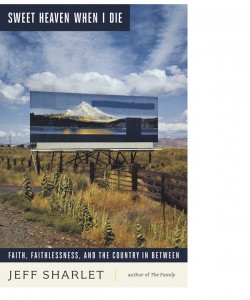 I recently read Jeff Sharlet’s Sweet Heaven When I Die: Faith, Faithlessness, and the Country In Between. It is a collection of essays loosely bound under a theme of religious expression, mostly exploring faith on the margins. I found most compelling, my favorite essays being the following:
I recently read Jeff Sharlet’s Sweet Heaven When I Die: Faith, Faithlessness, and the Country In Between. It is a collection of essays loosely bound under a theme of religious expression, mostly exploring faith on the margins. I found most compelling, my favorite essays being the following:
- Chapter 3, “Begin With the Dead” on prophetic Princeton professor, Cornel West
- Chapter 5, “Quebrado” on activist/anarchist Brad Will and his murder
- Chapter 9, “She Said Yes” on the fundamentalist, militant youth movement of Ron Luce and BattleCry
- Chapter 11, “The Rapture” on the capitalistic New Age movement
Here are the few highlights I made while reading the book (locations are from Kindle Edition):
You have to be willing to die. That’s the statement allowing you to live. (885)
Whereas academic philosophy tends to seek either ultimate truths or proof that no such truths are possible, pragmatism “evades” the question, instead trying “to deploy thought as a weapon to enable more effective action.” (1121)
“Justice is what love looks like in public.” (1158)
Icarus Project, an anarchist movement dedicated to the idea that much of what is classified as mental illness should be thought of as “dangerous gifts.” (1604)
If a National Guardsman shoots me down I’ll be looking him in the eye. (1854)
Both the Right and the Left despise this phenomenon. The Right thinks New Age is, literally, demonic, or at least shallow. The Left thinks New Age is consumer capitalism at its most dishonest, and-yes-shallow. And they’re right, all of them. The Christian crusaders and the intellectual scolds and even the New Agers themselves. Not because truth is relative, but because faith, by definition, always is. If it had an empirical basis, it wouldn’t be faith; it’d be the humdrum material world from which people turn to faith for meaning. (3308)
An entrepreneurial New Age faith like Sondra’s can serenely pigeonhole terror attacks and global disasters, regardless of why-or evidently when-they actually occur, because their meaning can be recast instantly, according to the spiritual need of the moment. It’s simple, really: Home Depot sells the idea of home, Best Buy sells a wired world, the new New Age sells “spiritual health”-while the right of the sovereign consumer to acquire it, purchase by purchase, is praised as the law of nature: an orthodoxy of a thousand choices, an infinitely marketable economy of belief. (3332)







